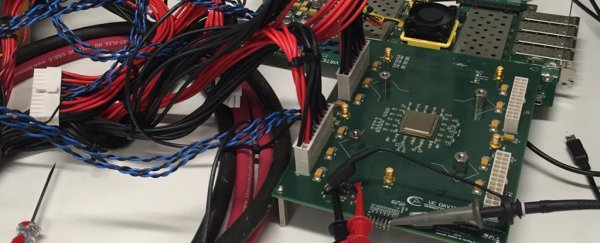Scientists have just unveiled the world's first 1,000-processor microchip, capable of working through 1.78 trillion instructions every second.
Each of those 1,000 processors can run independently, which makes the chip supremely suited to intensive tasks like encryption and weather forecasting – and thanks to some low-energy engineering, it can be powered by just one AA battery.
Because each processor can turn on and shut down independently of the others, it's about 100 times more efficient at executing instructions than the laptops of today, according to researchers who developed it at the University of California, Davis and IBM. It's called, logically enough, the KiloCore.
Today's top-end smartphones come with quad- or octa-core processors, so we're talking about more than a 100-fold increase in terms of the number of cores.
The more cores, the more tasks you can get through simultaneously, and while that doesn't make much of a difference for things like Facebook or Spotify, it can significantly boost supercomputer-level processing.
"To the best of our knowledge, it is the world's first 1,000-processor chip and it is the highest clock-rate processor ever designed in a university," said lead researcher Bevan Baas.
While today's laptop CPUs are based on a 14-nanometre scale, the 1,000-processor chip was developed using older 32-nanometre technology. Basically, the lower the number, the more transistors can be squeezed into the same place – which means there's still room for improvement with the KiloCore, even though it packs a whopping 621 million of these transistors right now.
According to earlier research by Baas and his team, no other 'many-core' projects have hit 300 cores, let alone 1,000. Unfortunately though, these types of chips are usually created for research projects, so don't expect to find one inside your next MacBook.
For comparison, the newly crowned fastest computer in the world features chips that have 260 cores on them – but it does have 41,000 such chips, giving it a grand total of 10.66 million processors with which to churn through computing tasks. But everything in computing is a trade-off, and you can't run supercomputers on a single AA battery.
Applications already developed for the KiloCore chip cover wireless coding and decoding, video processing, encryption, and a variety of scientific data applications.
To make the data throughput even greater, the chip's cores transfer data to each other directly, rather than using a shared pool of memory, which can create a bottleneck in other systems.
The KiloCore was presented at the 2016 Symposium on VLSI Technology and Circuits in Honolulu, Hawaii last week.
